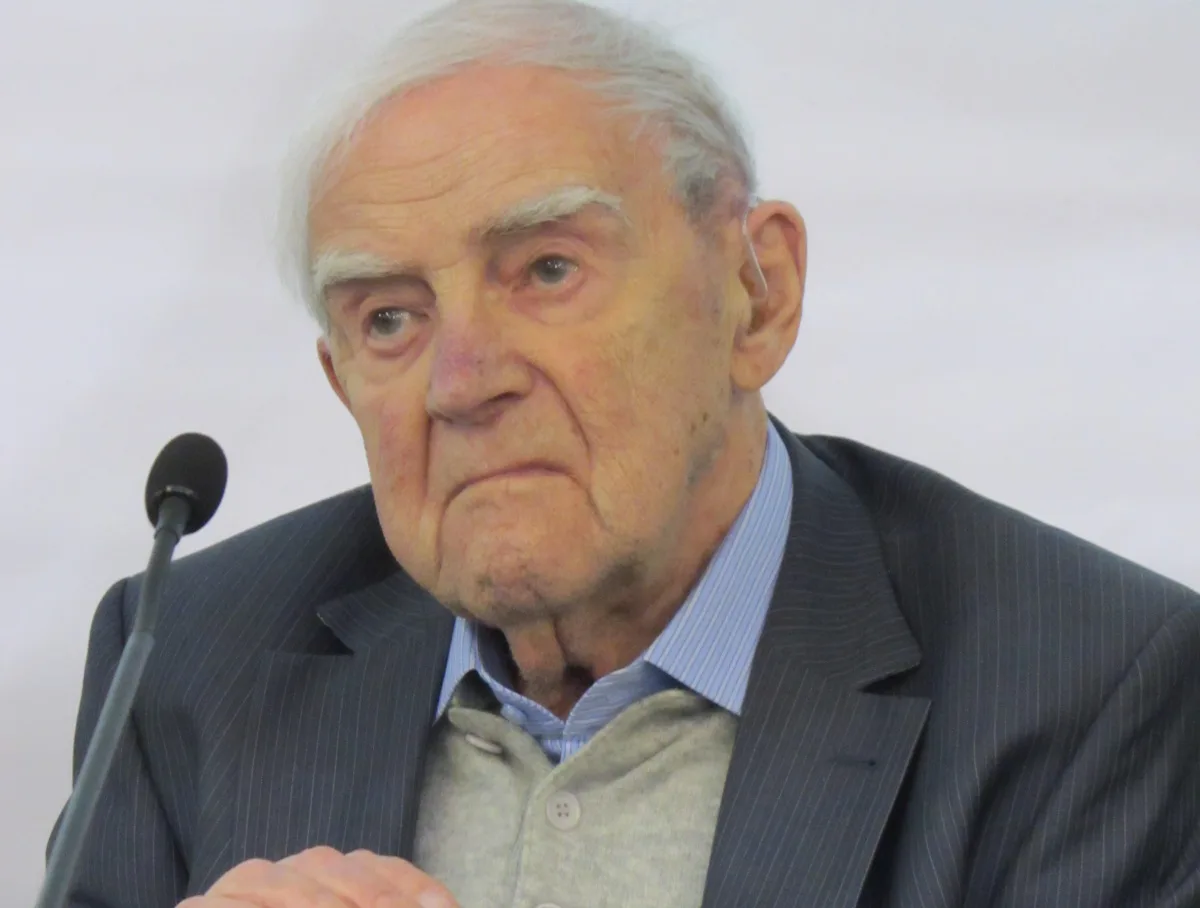The Internet often quotes a conversation between a famous Soviet writer and a resident of post-war Germany. We checked whether it actually took place.
According to a widely circulated text, the writer Daniil Granin told how he traveled with a delegation of writers to Buchenwald. The camp is located very close to the city of Weimar, and Granin realized that the townspeople could clearly see the smoking chimneys of the crematoria. He became thirsty and, while they were pouring water for him at the kiosk, he asked the saleswoman how she felt during the war. “Oh, what are you talking about! - she answered, “We didn’t know anything!” Then he clarified: “But you saw the smoking pipes!” The saleswoman objected: “No. Didn't see it. We looked the other way." Further, Granin seems to write with bitterness that in order to look in the other direction, you need to know where not to look.
The actress and TV presenter write about this case Maria Shukshina, artist Katya Margolis, as well as numerous social network users. In particular, on Facebook you can find posts with 708, 644, 448 And 416 reposts at the time of writing this analysis.
Buchenwald was one of the largest concentration camps in Nazi Germany, located near the city of Weimar in Thuringia. Although Buchenwald did not officially have the status of a death camp, people had been exterminated there since the summer of 1937. Until April 1945 in the camp died about 56,000 people, including victims of malnutrition and human experimentation. For the first three years, human remains were burned in the crematorium Weimar, and after 1940 at the concentration camp appeared your crematorium. After the fall of the Third Reich, the territory of the complex used Soviet troops as a special internment camp, and in 1948 it turned on into the Gulag system.
In 1957, the young Soviet writer Daniil Granin visited Buchenwald. The trip was not reflected in his famous works (for example, in five-volume collected works do not mention the concentration camp). However, in one of the issues of Literaturnaya Gazeta for the same year, a voluminous article by the writer was published entitled “Buchenwald Bowl" In it, Granin talks in detail about his impressions of Buchenwald and neighboring Weimar, about the horrors, evidence of which appeared before him. However, in the text there is no mention of the German woman “looking in the wrong direction,” nor is there any description of conversations on this topic with local residents.
“Verified” found no traces of this story in other authoritative sources related to Granin: books, periodicals and transcripts speeches. The oldest mention of this case on the Web (including the Google Books archive) is only in 2008, when it mentioned LJ user leon-orr (Zhanna Svet). In a comment to her post, she tells the story in her own words, and it is in this form that the story then spread across the Internet. So, in 2014, leon-orr’s comment was almost entirely quoted already in the main post of another user. New turn The popularity of the story fell in the spring of 2022.
Here we need to separately highlight one of the later network options stories about Granin, somewhat different from others. In it, Granin does not hear the answer “We looked the other way,” but he mentally predicts it and dreams of the fawn hat that he will be given at the Writers’ Union for writing a note. However, the German saleswoman unexpectedly asks a counter question: “Where do you usually look when sailing along the White Sea Canal? So as not to see the graves of Gulag prisoners on both sides?” Granin’s self-irony, the mention of the Soviet camp, and the use of the word “capslock” in the text do not fit with the realities of the 1950s and censorship. Indeed, such a rethinking of the story about the writer belongs to the pen of his colleague Igor Ponochevny. The publication appeared in July 2022 in Facebook- the author’s account and caused a wide response. In the comments, the author himself admitted that his text was an irony over the common story (which at that time had already been promoted, in particular, by Maria Shukshina).

Can we say that the story of Daniil Granin came out of nowhere? Definitely not. Alexander Vinnikov in his book “The Price of Freedom” (1998) mentions an unnamed resident of the village of Auschwitz, who gave a similar answer to the question about the pipes of the concentration camp of the same name. Raphael Goldberg in The Book of the Executed (1999) also writes, that I read about “people who lived side by side with Hitler’s huge concentration camps” and expressed similar opinions. A similar, but slightly different case is mentioned in the fiction book by Vladimir Krupin “Let's be like children"(1989). Dmitry Bykov did not refer to Granin in 2023 and also mentioned Auschwitz. In general, judging by its frequent use in quotation marks, the expression “look the other way” meaning “not pay attention to the crimes being committed” has been known for a long time, including on West. In 2015, Pope Francis I used him, talking about the Armenian genocide.
However, the situation most similar to “Daniil Granin’s story” is described in the novel by Australian writer Dymphna Cusack “Hot summer in Berlin"(1961). Heroine shares memories about his visit to the former Dachau concentration camp after the surrender of Germany. At the water kiosk, she got into a conversation with the saleswoman, and she, in response to the mention of the yellow smoke pouring out of the chimneys of the camp during the war, calmly replied: “I never looked in that direction.” Cusack's work was published in the USSR repeatedly and was quite popular. In a conversation with Verified, Zhanna Svet, the author of the oldest recorded mention of the story of Granin, said that she had read this novel. She did not rule out that in her memory the episode from “Hot Summer in Berlin” and the knowledge of Daniil Granin’s visit to Buchenwald could have been mixed up and formed into such a bizarre plot. The final thought of the story (“to look in the other direction, you need to know where you shouldn’t look”), Zhanna Svet, according to her, put Granin into her mouth herself.
Thus, in all likelihood, the story of Daniil Granin goes back to Dymphna Cusack’s novel “Hot Summer in Berlin,” and the Soviet and Russian writer turned out to be involved in it by mistake. There is no evidence linking him to this case.
Cover photo: social networks
Read on topic:
If you find a spelling or grammatical error, please let us know by highlighting the error text and clicking Ctrl+Enter.






